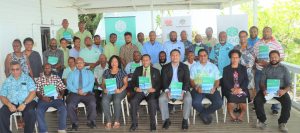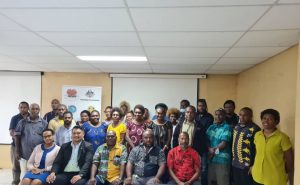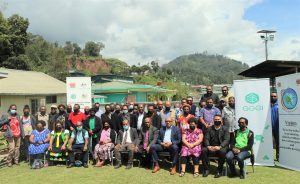Global Green Growth Institute (GGGI) has been supporting Enga, Milne Bay, and New Ireland Provinces on their Climate-Resilient Green Growth (CRGG) journey since 2019 as pilots for the implementation of the CRGG Project funded by the Australian Government.
The project essentially seeks to mainstream the development policies, plans, and budgets of provinces in PNG to be climate-resilient, environmentally sustainable, and socially inclusive, implement bankable projects, and mobilize green investments and climate finance mechanisms to support this effort.

The committed leadership and ownership from the three provinces were instrumental in the successful uptake and implementation of CRGG mainstreaming.
Through bottom-up provincial and community engagement and participation, Milne Bay and New Ireland Provinces developed a CRGG Strategy each reflecting their climate change priorities to be incorporated and implemented under their new Integrated Provincial Development Plan 2023-2027. Both provinces validated their CRGG Strategy in March this year with wide support and endorsement from key stakeholders from across government, civil society, and the private sector. The CRGG Strategies were also presented to the respective Provincial Executive Council (PEC) and got adopted by the PEC.
Enga Province also developed through a socially inclusive and locally-driven process a CRGG Action Plan to guide the implementation of the priority CRGG initiatives already mainstreamed into the province’s Enga StepUp! Development Plan 2022-2030. The CRGG Action Plan was validated and endorsed last month in a two-day workshop involving over 30 participants from diverse provincial stakeholders with strong women’s representation.

The development of a CRGG plan is an important milestone and step in the right direction for the three provinces in addressing their climate resilience and green growth challenges. The CRGG plans will inform the provinces’ green growth policy direction for an inclusive greener future.
The provinces were fully engaged in the CRGG process and contributed significantly to the development and drafting of the CRGG plans. This is a clear sign of provinces being at the driver’s seat from the onset, taking ownership and leading in the development of local climate solutions to address the climate change risks they face.
They formulated bold and ambitious CRGG targets to lead them to a transformative climate-resilient green economic model. The next step for the provinces is to translate these innovative ideas in paper into actionable CRGG interventions and mobilize resources for implementing the CRGG priorities to bring impact at scale benefiting the people of Papua New Guinea.
The mainstreaming experience and successes from these provinces will be replicated in other provinces including the identified shadow provinces (Chimbu, Eastern Highlands, Manus, and Morobe) that are expected to implement similar projects under the next phase of CRGG.

The Australia-funded CRGG Project is implemented by GGGI in partnership with the Papua New Guinea Climate Change and Development Authority and aims to deliver climate resilience and green growth projects in multiple sectors in PNG provinces with leveraged finance.
Local GGGI communications contact
Peniamina Leavai, Deputy Country Representative, Papua New Guinea
peniamina.leavai@GGGI.org